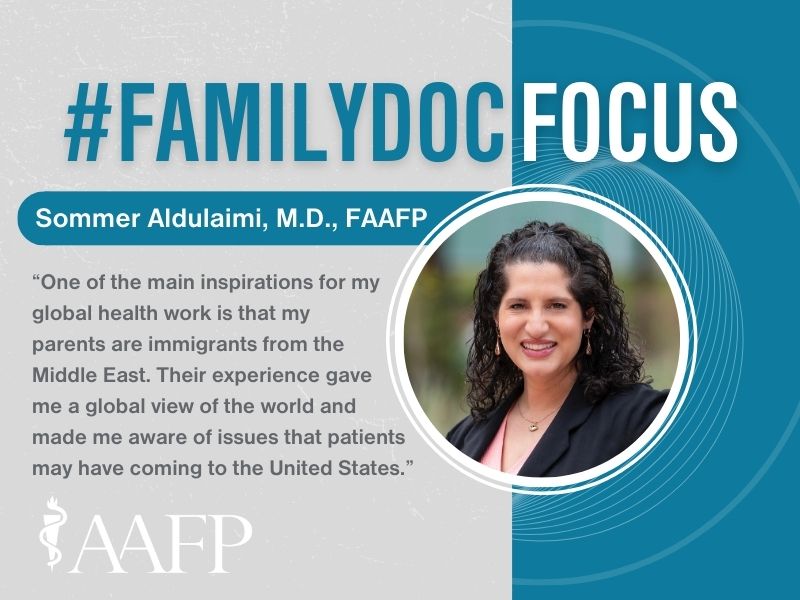Arizona Mentor Brings Global View to Training
Aug. 8, 2024, David Mitchell — Sommer Aldulaimi, M.D., FAAFP, understands the challenges immigrants face while adapting to a new language and culture. Her mother came to the United States from Iran as a child, and her father immigrated from Iraq as a teenager.

“One of the main inspirations for my global health work is that my parents are immigrants from the Middle East,” said, Aldulaimi, co-director of Global Health Programs in the Office of Global and Border Health at the University of Arizona College of Medicine in Tucson. “Their experience gave me a global view of the world and made me aware of issues that patients may have coming to the United States. That started my passion for caring for patients who are marginalized, who are immigrants in general and those who are refugees.”
Aldulaimi planned a career in pediatrics, but a global health rotation in Honduras between her first and second years at the University of Arizona College of Medicine changed her path.
“It showed me that when you’re doing global health work, the broader the training you have the better,” said Aldulaimi, an associate professor in the Department of Family and Community Medicine and core faculty for the family medicine residency. “If I had done pediatrics, I would be limited and wouldn’t be able to take care of pregnant patients and adult patients. If I decided to do OB, I would be limited to women’s health and wouldn’t be able to take care of newborns. I recognized that I needed broader training for global health work. I love the idea of caring for whole families and being able to care for patients from birth until death in multiple different settings because I like the hospital and clinic. I wanted a job that allowed me to do all those things.”
Aldulaimi started her residency’s global health track at the end of her intern year. In addition to Honduras, her travels have taken her to Ecuador, Guatemala, Mexico and Tanzania.
“I did a lot of research about what the benefit of a global health track would be,” she said. “The goal of our residency program is to care for underserved patients and to fill the gaps in underserved places in the U.S., especially in Arizona and rural and underserved areas. It was clear from the evidence that residents who have global health experiences during their residency are much more likely to practice in underserved areas, both abroad and domestically, so it fit the mission of our program. I still thought I was going to have to try to convince the faculty. When I presented this evidence, the program director was like, ‘That sounds great. How can I help?’”
In addition to encouragement from then-program director Vic Weaver, M.D., Aldulaimi’s idea also got support from Ron Pust, M.D., who was director of the Office of Global and Border Health at the time.
“Residents could go on a global health rotation before, but now it’s part of a comprehensive program,” said Aldulaimi, who said residents in the track participate in a global health course and monthly journal clubs. “That is so important is because we want to make sure that residents are adequately prepared to go abroad, both ethically and medically.”
Aldulaimi is an advisory board member for the AAFP’s Center for Global Health Initiatives and is a is member of the Working Group on Global Health Curriculum, which is a collaborative effort of the Academy and the Society of Teachers of Family Medicine. As a result of that work, aspects of Arizona’s global health training track can be found in an STFM global health toolkit designed to guide residency programs in the development of a global health curriculum.
Aldulaimi was in the first class to graduate from the residency’s global health track in 2014. A few years later, the University of Arizona’s Family Medicine Residency added a clinic for complex refugee patients at its south campus clinic. The program has since expanded to two clinics per month at two locations.
During the AAFP Global Health Summit (a preconference to the Family Medicine Experience) Sept. 22-23 in Phoenix, Aldulaimi and Jerome Koleski, M.D., the other co-director of Arizona’s Global Health Programs, will present a breakout session focused on care of complex refugee patients.
“What we’re really hoping for is to be able to give people tools in their toolbox to take better care of more complex refugees that they’re seeing in their own practice,” she said. “How can they better address their issues, and what are things that they need to look out for? What are the more complex issues that refugees may have that other patients may not?”
Residents from multiple specialties and medical students participate in the refugee clinics, which also benefit from a public health intern, a refugee health coordinator and an attorney. Aldulaimi is medical director of the Tucson Family Advocacy Program, the school’s medical-legal partnership.
“We see a lot of refugees in Arizona,” Aldulaimi said. “At one of our clinics, one in every four patients that our residents see are refugees from all over the world. It’s important to train residents to really have a high level of cultural humility and to be able to approach patients from lots of different backgrounds and partner with them. That is something they gain from these experiences.”
The College of Medicine’s Global and Border Health program has grown significantly post-pandemic. Aldulaimi said about 40 medicals students are participating in that program.
“We keep track of what they match into, and our students who do the global health program have a higher rate of matching into primary care specialties than the general population of the College of Medicine,” she said.